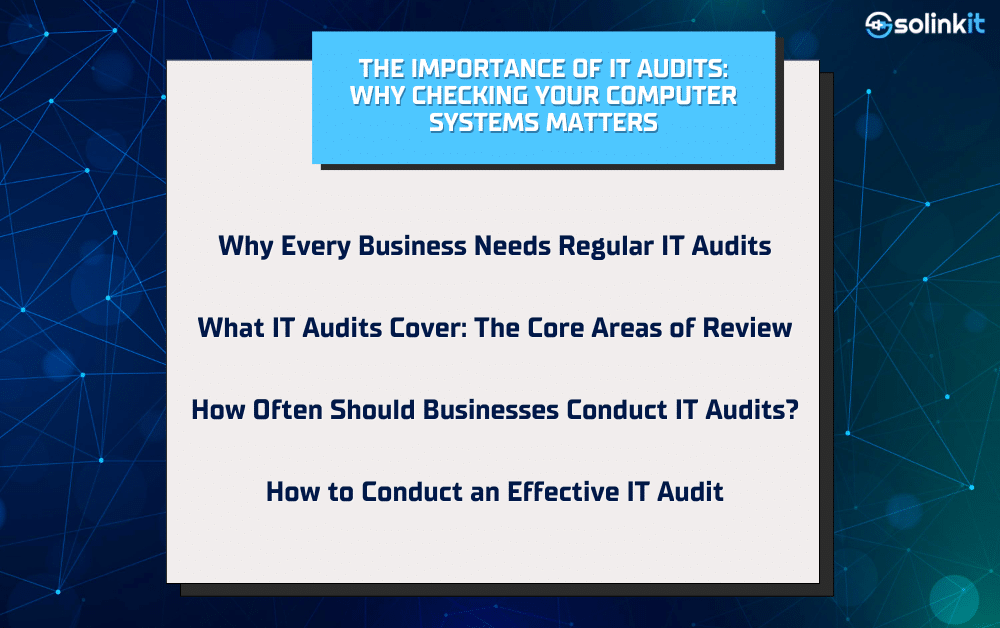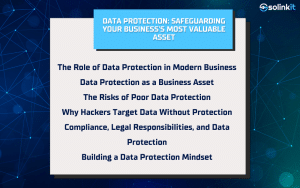Technology plays a critical role in running a successful business. From storing customer data to managing day-to-day operations, businesses rely on IT systems to keep everything running smoothly. However, many business owners overlook one key aspect of technology management—regular IT audits.
An IT audit is a structured review of your company’s technology infrastructure, ensuring that your systems are secure, efficient, and compliant with industry regulations. Without regular IT audits, businesses risk cyber threats, compliance violations, and costly downtime. This article explains why IT audits are essential, what they cover, how often they should be conducted, and how to implement them effectively.
Why Every Business Needs Regular IT Audits
Protecting Your Business from Cyber Threats
As cyber threats grow more advanced, businesses of all sizes must take proactive steps to secure their IT systems. An IT audit helps identify vulnerabilities before they become costly security breaches. Cybercriminals target businesses that lack strong security measures, and a single data breach can lead to financial losses, legal consequences, and reputational damage.
Ensuring Compliance with Industry Regulations
Beyond security, IT audits help businesses maintain compliance with regulations like GDPR, HIPAA, and PCI-DSS. Failure to meet these requirements can result in fines and penalties, which can be avoided with regular system reviews.
Improving System Performance and Efficiency
IT audits also improve operational efficiency by identifying outdated software, slow-performing hardware, and other inefficiencies that can hinder productivity. A well-optimized IT system helps employees work more efficiently and prevents unexpected downtime.
Protecting Business Data and Preventing Loss
Another key benefit of IT audits is data protection. Many businesses rely on digital records for financial data, customer information, and operational processes. Without proper backup and security measures, this data could be lost due to hardware failures, cyberattacks, or accidental deletions. IT audits evaluate a business’s data backup and disaster recovery strategies, ensuring critical information is protected.
What IT Audits Cover: The Core Areas of Review
Evaluating Security and Threat Protection
A thorough IT audit examines several key areas to ensure a business’s technology infrastructure is secure, efficient, and compliant. The first and most important aspect of an IT audit is security. This includes evaluating firewalls, antivirus software, access controls, and password policies. The audit identifies weak points in cybersecurity and provides recommendations to strengthen defenses against hackers and data breaches.
Checking Compliance with Regulations
Businesses in industries such as healthcare, finance, and e-commerce must meet specific data protection regulations. An IT audit verifies that all security policies align with regulatory requirements, reducing the risk of penalties and legal issues.
Assessing System Performance and Hardware Health
System performance and hardware efficiency are also reviewed during an IT audit. Over time, outdated hardware and unpatched software can slow down business operations and increase the risk of system failures. The audit assesses the current IT infrastructure and identifies opportunities for upgrades or replacements that can improve overall performance.
Reviewing Data Management and Backup Plans
Data management and backup procedures are evaluated to ensure businesses have reliable recovery plans in place. IT audits examine how data is stored, backed up, and restored in case of cyberattacks or hardware failures. Without a solid backup strategy, businesses risk losing important information that could disrupt operations.
How Often Should Businesses Conduct IT Audits?
Factors That Determine IT Audit Frequency
The frequency of IT audits depends on the size of a business, the industry it operates in, and the complexity of its IT systems. Businesses that handle sensitive customer information, such as medical records or financial data, should conduct IT audits at least quarterly. This ensures that security measures remain effective and compliance requirements are continuously met.
Recommended IT Audit Schedules
For most businesses, an annual IT audit is sufficient to maintain security, efficiency, and compliance. However, businesses that experience frequent system upgrades or handle large volumes of online transactions should consider biannual IT audits.
When to Conduct an Additional IT Audit
In addition to scheduled audits, businesses should conduct IT audits after major changes, such as implementing new software, experiencing a security incident, or expanding operations. These events can introduce new vulnerabilities that need to be addressed immediately.
How to Conduct an Effective IT Audit
Step 1: Assess IT Infrastructure and Security
Implementing an IT audit requires a structured approach to ensure all aspects of a business’s technology infrastructure are thoroughly reviewed. The process begins with a full assessment of IT assets, including hardware, software, and network security. This step helps identify outdated systems, weak security measures, and inefficiencies that may impact business performance.
Step 2: Review Data Backup and Recovery Plans
Next, data management and backup procedures should be evaluated. IT audits ensure that all critical data is securely stored and can be recovered in case of an emergency. Businesses should review their backup policies and ensure they align with best practices for disaster recovery.
Step 3: Test Security Measures and Compliance
Security policies, including password management, access controls, and firewall protections, should be tested for vulnerabilities. Penetration testing and cybersecurity risk assessments can help businesses identify weaknesses in their security protocols.
Step 4: Create an Action Plan for Improvements
Finally, businesses should document all findings from the IT audit and develop an action plan for improvements. Any security gaps, outdated technology, or compliance issues should be addressed promptly to minimize risks.
Protect Your Business with Regular IT Audits
IT audits are not just for large corporations—they are essential for businesses of all sizes. Regular audits help identify security threats, improve system performance, and ensure compliance with industry regulations. By proactively reviewing IT infrastructure, business owners can prevent costly downtime, data breaches, and compliance violations.
Rather than waiting for a security incident or technology failure, businesses should take a proactive approach to IT management. Scheduling regular IT audits with a trusted technology partner ensures that systems remain secure, efficient, and aligned with business goals.
If your business hasn’t conducted an IT audit recently, now is the time to act. Contact SoLinkit today to schedule a comprehensive IT audit and safeguard your business’s technology infrastructure.






